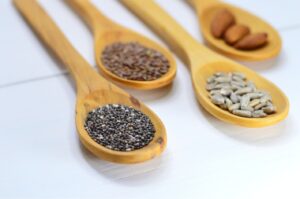How does stress relate to our nutritional status? How we handle our external stressors is very important. Over time, the effects of internal stress can lead our bodies to a tipping point. If your body is stressed out without relief, sooner or later you will find yourself in an exhausted, overwhelmed and anxious state of both mind and body. Stress can affect your internal organs and your nutrient uptake, which ultimately effects your nutritional status in the form of nutritional imbalances or nutritional deficiencies.
To remain healthy, these issues need to be corrected and they can be corrected by changing what we eat and taking supplements to replenish what’s been lost which helps to resolve the stress in our bodies.
Nutrition and Stress
We have a lot of power to change our bodies at the cellular level with nutrition. Nutrigenomics is the study of how food and what we eat can change the expression of our DNA at the cellular level. For example, we now know that now that how and what we eat can do things within your cells, like turning off the cancer gene. There is a lot you can do for your health if you clean up how you eat and change the quality of your diet.
3 Stages of Stress Leading to Disease
There are 3 stages of stress when our bodies reach a tipping point and begin to feel the stress as well as experience symptoms:
- Alarm stage – the fight or flight stage. If we don’t learn techniques to resolve stress it leads to resistance and the exhaustion. Sometimes we can resolve short term stress as simply as taking a walk after a stressful commute, but other times when we are stressed by a long-term project that’s due for example… we need an ongoing method to alleviate stress. This can include focusing on eating healthy, taking supplements, meditation (yoga classes!), regular exercise.
- Resistance Stage – This is when the body mechanisms are starting to shut down in terms of recovery. Long term resistance can lead to exhaustion and adrenal fatigue. You know that your stress level has advanced and you are feeling it in your body.
- Exhaustion – We don’t have a lot of energy to do much…

Stress versus Distress
Stress is like an umbrella where we have useful stress and distress. Good stress might be you are getting married and planning your wedding or your children are now having children for example… something in our lives that is positive, yet it is stressful to go through the process. Useful stress motivates us to get moving on things we need to do or accomplish. Distress on the other hand, are things that we perceive to be hurtful or harmful to us – being stuck in traffic jams or difficult situations we are experiencing at our work. Both types of stress are inevitable.
Internal and External Stress
External stress is everything happening on the outside which are often things that we have little or no control over.
Internal stress is everything that is going on inside of your body – your thoughts, your feelings and how well your organs are doing under stress. We often think of this type of stress as happening in the brain but in fact is affecting the whole organ/whole body systems. Internal stress is something for which we have a great deal of control.
We CAN change how we think, and we CAN practice things that relax our brain like yoga or meditation.
We CAN support our body and organs with healthy nourishing food. Food is the building blocks of everything in our bodies so you can change yourself just by eating really good food.

Nutrition and the Blood Sugar Curve
We think about blood sugar as it relates to diabetes, but we all have a blood sugar curve. Your blood sugar curve is released every day when you consume food. Glucose is our fuel so if our blood sugar is not balanced this adds a lot of stress to our body in the form of physical highs and lows during the course of a day. Physical exercise helps us to burn excess blood sugar and balance our systems. When we are stressed out, our blood sugar levels stay elevated until we’re able to process the additional blood sugar stress causes.
This is the cycle that leads to Type 2 diabetes. When we are under stress, our blood sugar levels can take up to 6 times longer to process after a meal than they would if we weren’t stressed. This then leads to more stress which can lead to long term illness.
Adding undue stress to the body effects energy production, brain clarity, weight balance, and a slew of other issues that begin to manifest when our blood sugar is not balanced. Making changes in your diet will help you to reduce stress by better managing your blood sugar levels.
Measuring Stress in the Body
Our Hair Mineral Analysis Test helps to determine the extent of nutritional deficiencies.
NERG (Neuro-Emotional Technique) and Dynamic Energy Healing are also tools that can be used to relieve stressors in the body. These tools get to the stressors stored in our body and help to get us out of a pattern that continues to build stress physically, mentally and emotionally. We need to be recharged and rejuvenated for our body to reset and to heal.
Schedule a free 15 minute zoom call to learn more about hair mineral analysis and supplements that may help your body handle stress.






